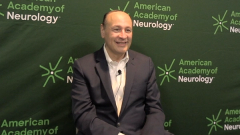
The Growing Role of AI in Neurology
In this segment, Pagan discussed the benefits of using AI in research and clinical practice, while also highlighting key considerations and cautions for clinicians.
At the
In this episode, Pagan discussed the expanding role of artificial intelligence (AI) in clinical neurology, emphasizing its potential to improve efficiency in documentation, data analysis, and diagnostic support—particularly in areas such as deep brain stimulation, EEG interpretation, and autonomic function assessment. Acknowledging AI’s growing capabilities, he also stressed the importance of clinician oversight to validate AI-generated information, noting that human expertise, critical thinking, and empathy remain essential in patient care.
Transcript below edited for clarity.
Fernando L. Pagan, MD: AI is all around us in today's world—in the medical world, the business world, the news world. So, AI is a tool that can definitely be helpful to a clinician. Hopefully, we’ll see AI help us write our notes more efficiently. But AI isn’t perfect, so if you are using AI, it’s always important to make sure that you fact-check it. You have to fact-check it, make sure you read it, make sure that it makes sense, because these bots don’t always make sense when you actually read the different information. It’s something that we will definitely see get a little bit better.
But AI in research can be used very efficiently when you're dealing with a lot of data. We’re kind of seeing it now—for example, in deep brain stimulation—to be able to make the proper decision on whether stimulation should go up or down. But as clinicians, we have to see how good that really is. We have to fact-check it ourselves—whether it's correlating well with patients—because only our input is going to help these things get better down the road.
We’ve also seen AI used in clinics or in clinical settings. There are devices that you can use to perform an EEG immediately, to see if a patient is in status epilepticus or not. In the middle of the night, if you don’t have an epileptologist readily available, these devices now are connected with AI to let the provider know whether or not the patient is in status epilepticus or not—even if the individual who just placed the device on the patient's brain doesn’t know how to read an EEG. So, there is great technology happening, but it’s important that as we roll these out, have neurologists, clinicians, and healthcare providers fact-checking and making sure it’s right. Always double-checking it, I think, is very important.
I’ve seen AI used in certain programs to assess whether a patient has neurogenic orthostatic hypotension or autonomic dysfunction, etc. And sometimes the readings aren’t exactly accurate, so interpretation by a clinician is still necessary. But it can be an assistant—to really show you the area you need to take a look at.
I think in all areas of neurology—whether it’s movement disorders, autonomic specialists, EEGs, or even just going through the vast amount of papers out there to highlight important research—AI can help. Then you go back and take a look to see if the AI read it appropriately. I think these are tools to help us become a little more efficient.
However, it still requires us—not to get lazy. It still requires our interpretation to back-check it, because a computer is only as good as its programmer. So, AI is not smarter than the human mind or brain yet. Caution is always necessary for us in the medical field. But these are tools. And I hear jokes like, “Oh, they're trying to take our clinical notes so that a neurologist will be an AI bot.” No, I don’t think we’ll ever get there. The human compassion, the empathy, the touch—that is necessary as a physician—you can never let go of that. That’s what makes us different than a computer.
Newsletter
Keep your finger on the pulse of neurology—subscribe to NeurologyLive for expert interviews, new data, and breakthrough treatment updates.











